Bangkok Travel Safety in 2024: Top Tips for a Secure Visit
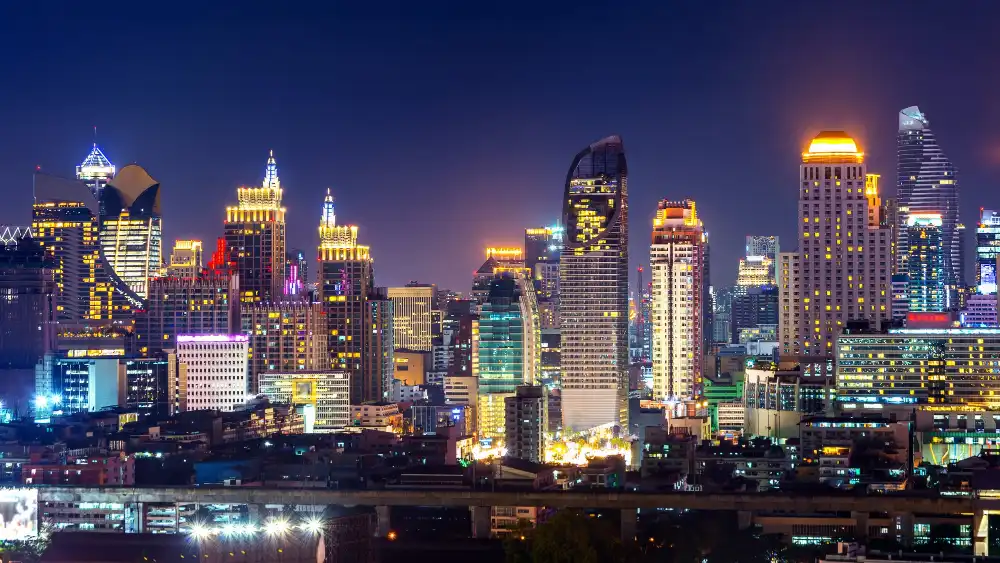
Table Of Contents
Visitors to Bangkok can enjoy a generally safe atmosphere but should stay vigilant of scams, pickpocketing, and navigate with caution in areas known for higher crime rates, especially at night.
To safely experience Bangkok’s nightlife, tourists should explore earlier in the evening, watch out for pickpockets, be cautious of drink spiking, and use reputable transportation services like Grab taxis.
(Solo) Travelers should avoid excessive drinking and illegal substances, stay in well-reviewed accommodations, be wary of the red light district, and ensure they have travel insurance before exploring Bangkok.
Wondering about safety in Bangkok? In short, Bangkok is safe for travelers, if you know where to go and where to be cautious. This straight-to-the-point guide answers your safety questions, offering advice on navigating Bangkok’s vibrant city life with confidence. Learn which neighborhoods welcome tourists with open arms and practical tips to avoid common pitfalls. Ready to explore safely? Let’s dive in.
Key Takeaways
Scams
Dangerous traffic
Petty crimes such as pickpocketing and bag snatching
Navigating Bangkok taxis
Bangkok Safety Overview: The Good and The Bad
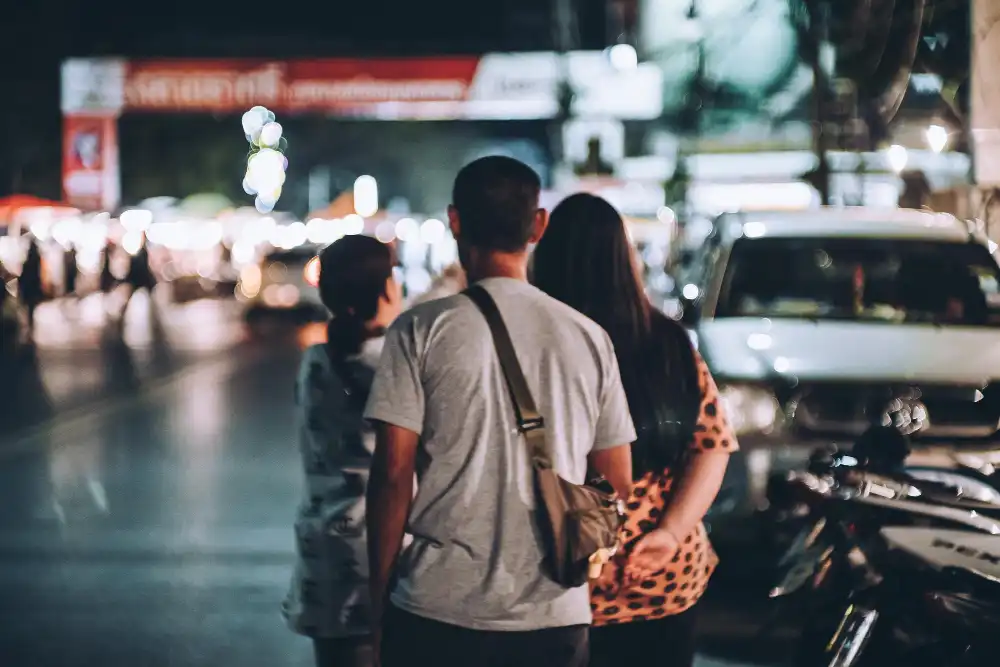
As the largest city and capital city in Thailand, Bangkok draws nearly 26 million tourists annually with its dynamic culture and nightlife. The city is generally safe for visitors with a very low risk of serious danger, attracting travelers worldwide to its vibrant street life and cultural landmarks. Bangkok’s safety record is a testament to the Thai authorities’ efforts and the warmth of the Thai people.
However, as in any major city, visitors should be aware of certain challenges. Some of the challenges to be aware of in major cities like Bangkok include:
But don’t let this deter you from visiting Bangkok. With the right travel advice and precautions, you can explore Bangkok safely and enjoy what this incredible city has to offer.
So, what are the safe and not-so-safe areas in Bangkok? Which ones should you explore, and where should you tread carefully?
Safe Areas for Tourists
Knowing the safe areas for tourists is vital when you visit Thailand, especially Bangkok. The city’s geography includes key tourist districts like Sukhumvit, Siam, and Rattanakosin Island along the Chao Phraya River. These areas are known for their reputable safety and vibrant tourist attractions.
Sukhumvit is a safe and lively area, popular with tourists and expats. Known for its upscale shopping, dining, and nightlife, it’s home to many hotels and is convenient for exploring the city. Just a stone’s throw away, you’ll find the Siam neighborhood, recognized for its extensive shopping centers and generally safe for tourists.
For a mix of business and entertainment, Silom is your go-to neighborhood. Offering night markets and a myriad of entertainment options, it’s a safe area known for its nightlife and street food. If you prefer a more culturally enriched experience, Riverside and Rattanakosin, the old town, offer picturesque views and historically rich sites that are deemed safe for visitors. These safe areas in Bangkok ensure that your visit to Thailand is secure and pleasant.
Areas to Avoid or Exercise Caution
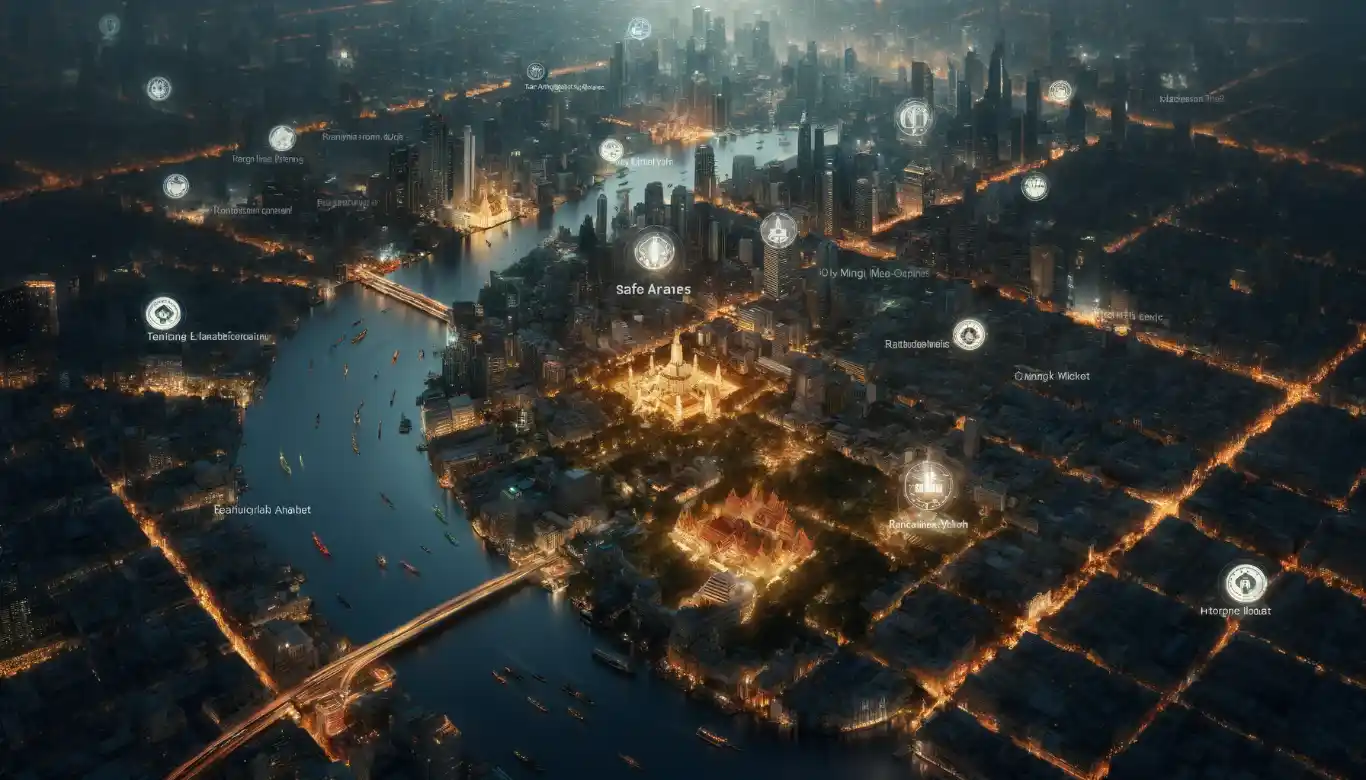
Although Bangkok is generally safe, some areas require tourists to be cautious, especially at night. Nana Plaza, Patpong, and the Khlong Toei districts are known for higher crime rates and can become sketchy after dark.
Areas like Phahurat and Pahurat Market, Nana Plaza and Soi Cowboy are known for adult entertainment venues and can attract unsavory characters. While these areas offer a glimpse of Bangkok’s wild nightlife, visitors are advised to stay vigilant and avoid flaunting wealth or taking illegal substances.
Even in these southern provinces, the risk of violent crime is low. However, it’s advisable to stay aware of your surroundings, especially if you’re a solo traveler. The key is to blend in, respect local customs and local laws, and keep your wits about you.
Explore earlier in the evening, as most bars close around midnight to 1am.
Be aware of pickpockets and consider wearing clothes with zipper pockets for extra security.
When attending boat parties or venturing into the bustling Khao San Road, book through reputable hotels to enhance the safety of the trip.
Exploring Bangkok Safely After Dark
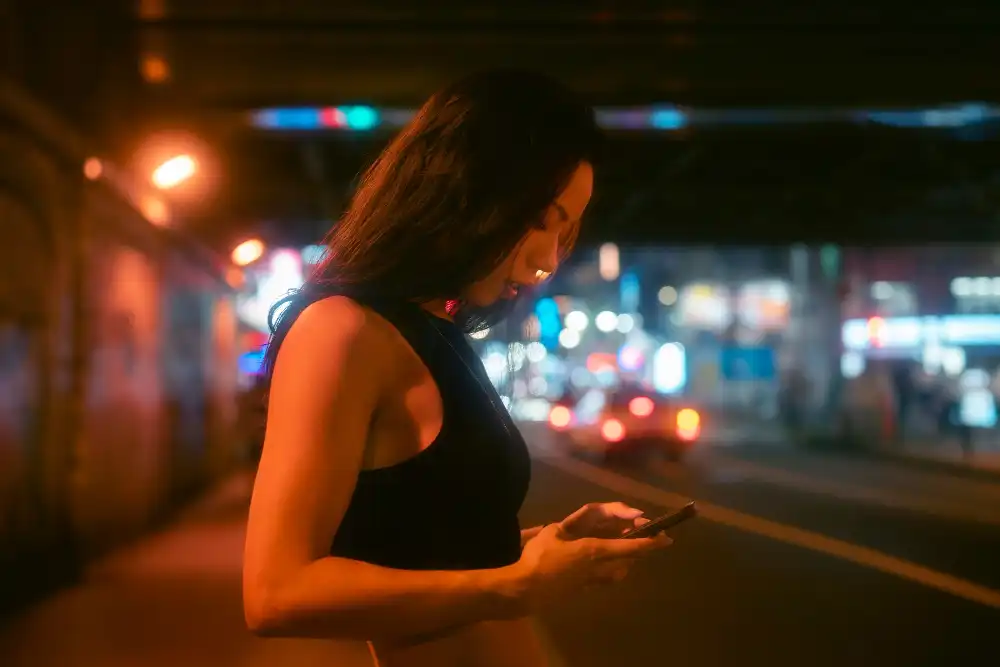
Bangkok’s legendary nightlife is safe to explore for visitors, as long as certain precautions are taken. Some areas can become sketchy after dark, so it’s good practice to stay vigilant and follow local advice.
If you plan to enjoy Bangkok’s nightlife, here are some tips to keep in mind:
Solo travelers should be extra careful. Avoid leaving drinks unattended and be vigilant about drink spiking by keeping drinks in hand and watching for signs of tampering. And if you’re unsure about the safety of a neighborhood at night, opt for a Grab taxi service to ensure a safe return to your accommodation.
Avoid using illegal substances and excessive drinking due to strict drug laws and potential safety risks
Take precautions when visiting the red light district
Stay in well-reviewed accommodations
Make friends carefully and trust your instincts to avoid sketchy situations
Solo Travelers: Safety Tips and Advice
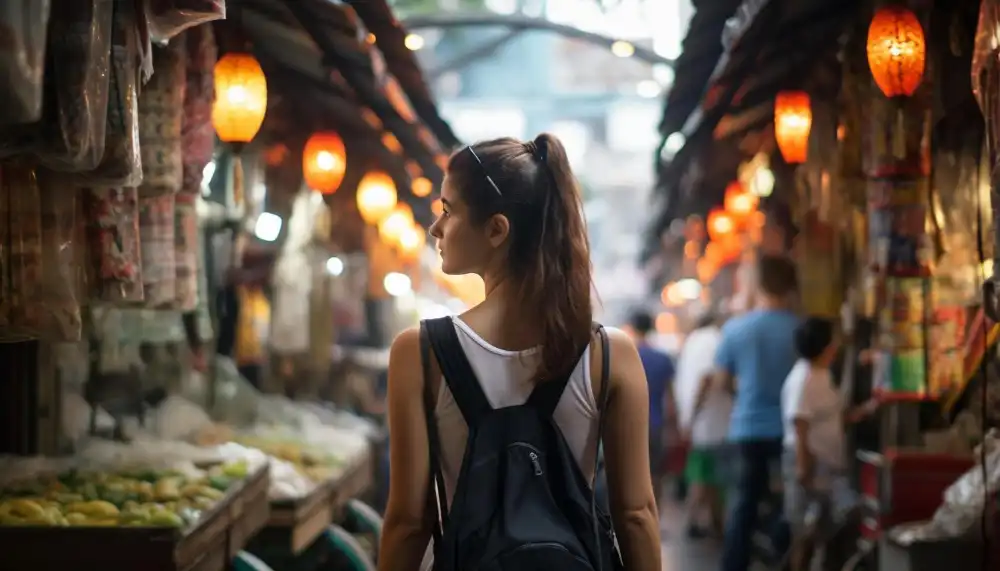
Solo travel can be liberating, and Bangkok, especially in areas with high tourist traffic, is a relatively safe destination for solo female travelers. However, it’s important to take some precautions.
Solo travelers visiting Thailand should:
During the day, the streets of Bangkok are generally safe for solo travelers. However, it is important to remain cautious and aware of your surroundings.
Scam Prevention: Tips and Tricks
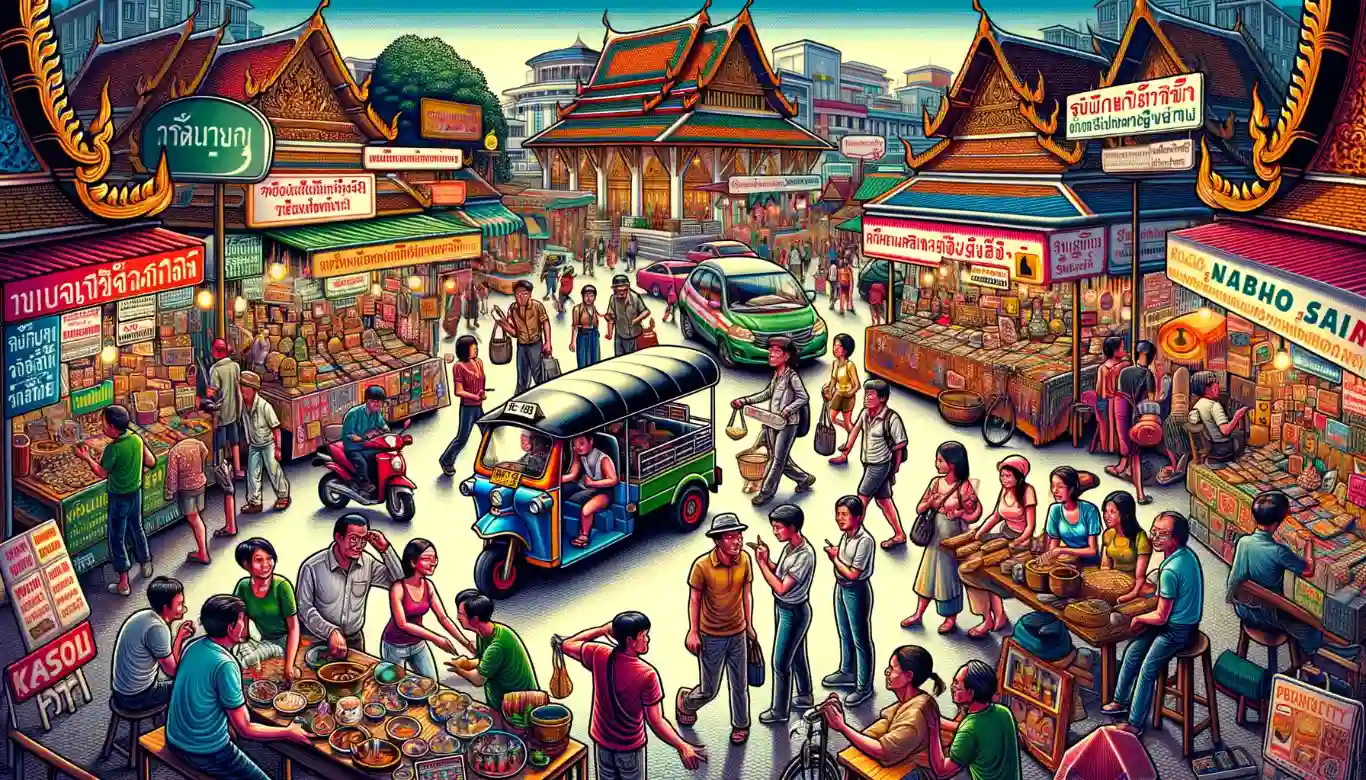
Tourist Scam Awareness in Bangkok's Markets
Tourists anywhere can potentially face the nuisance of scams, including in Bangkok. However, with some awareness and basic precautions, you can easily prevent falling victim to most scams.
One common trick involves tuk-tuk and taxi drivers who may overcharge, take longer routes, or bring tourists to shops for commissions. To avoid this, agree on a fare upfront, or better yet, use metered taxis or reputable ride-hailing apps.
Another common scam claims the Grand Palace, a significant site for the royal family, is closed, and the only way to enter is through a specific tour or guide. Remember, the Grand Palace rarely closes, so always head to the official entrance.
When enjoying the nightlife, verify drink prices before ordering, and consider purchasing bottled drinks over bucket drinks to avoid inflated bills. And if you plan to rent motorbikes or jet skis, avoid sources known for fraudulent damage claims, and always inspect the vehicle thoroughly before renting.
Chickenpox
Diphtheria-Tetanus-Pertussis
Influenza
Measles-Mumps-Rubella (MMR)
Polio
Shingles
Hepatitis A
Hepatitis B
Japanese Encephalitis
Typhoid
Rabies
Consume only bottled or disinfected water
Avoid unsealed ice
Maintain hydration and salt levels by eating local Thai meals or drinking electrolyte solutions
Health Measures and Vaccinations
Maintaining good health is key to enjoying your Bangkok trip, and adopting appropriate health measures can help you have a worry-free vacation. Up-to-date vaccinations are a must. Besides routine vaccines like:
Specific to traveling in Bangkok, it’s also advised to receive vaccinations for:
depending on your travel plans and the length of stay. If you’re arriving from a country with Yellow Fever virus transmission, you must show proof of Yellow Fever vaccination.
Also, due to the risk of water-borne diseases, tourists are advised to:
If you’re traveling to areas in Bangkok at risk for malaria, consider taking prescription antimalarial medication, starting several days before the trip.
Medical Care Accessibility in Bangkok

Any travel plan should prioritize good healthcare. Thankfully, Bangkok offers high-quality medical care in both private and government-run hospitals, with private hospitals being more accessible to Westerners. These private establishments often offer luxury-like environments and premium services akin to upscale hotels.
Scheduling appointments and choosing specialists in private hospitals can be done via online systems, which also provide information on qualifications and reviews. While most doctors speak English, communication with other medical staff might present challenges, and it can be beneficial to have a translator, especially during the admissions process.
The cost for medical care in government hospitals is approximately one-third of what is charged in Western Europe, making Bangkok a cost-effective destination for healthcare. In cases of emergency, Bangkok offers a specialized motorcycle ambulance service, enabling faster response times by navigating through heavy traffic and reaching remote areas swiftly.
Queue up
Stay behind the yellow line
Give up seats to those in greater need
Hold onto straps or handrails firmly
Always allow passengers to exit the train first
Be mindful of the gap between the train and platform to prevent accidents
Remember not to lean on train doors, block door areas, or place hands or objects near the doors for personal safety.
Public Transportation: Navigating Bangkok Efficiently and Safely

Exploring Bangkok is an adventure, and the city’s public transportation system is a vital part of this experience. Bangkok’s public transportation includes the BTS (Skytrain), MRT (metro), and an extensive network of boats that navigate the city’s waterways.
When using the BTS or MRT, follow safety (and politeness) procedures:
On all forms of public transport, remain vigilant against pickpockets, especially on buses, where they are more prevalent. Should you encounter any emergencies while using public transport, you can call the Tourist Police at any time.
Cultural Sensitivity: Respecting Local Customs and Traditions
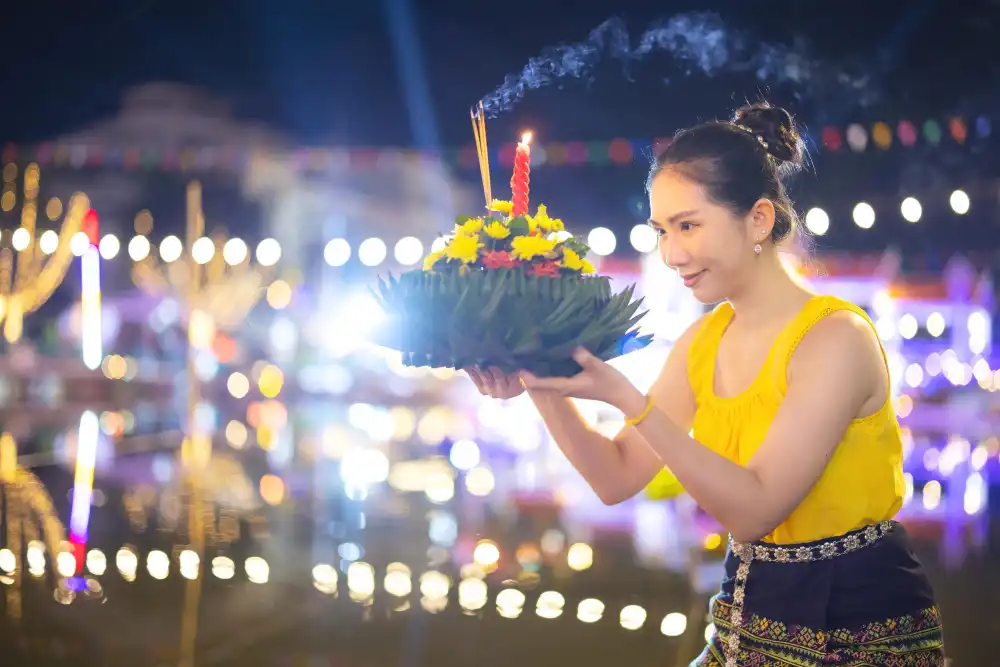
Immersing yourself in the local culture is one of the highlights of a Bangkok visit. However, it’s essential to respect local customs and traditions. Showing respect at religious sites and during local festivals is crucial due to the city’s emphasis on cultural sensitivity in these settings.
Non-verbal cues play an essential role in Thai communication, highlighting the importance of reading facial expressions and body language to grasp underlying messages. Building strong personal relationships is highly valued in Thai culture, fostering collaboration, teamwork, and contributing to work-life balance and social cohesion.
By learning about local customs and practices, you can engage respectfully in Bangkok, enhancing communication and preventing unintentional offense. This not only enriches your travel experience but also fosters a respectful and mutually beneficial interaction with the local community.
Wear loose clothing made from natural fabrics like cotton or linen in light colors
Wear hats and sunglasses for sun protection
Exercise during cooler parts of the day, like early morning or late at night
Embrace a more leisurely pace and focus your activities indoors
Adapting to Bangkok's Tropical Climate: Tips for Travelers

Every month in Thailand presents a unique climate profile, influencing everything from your packing list to the activities you schedule. In our Thailand's weather guide we have covered the weather month by month in depth. Make sure to checkt it out!
The heat and humidity characteristic of Bangkok’s climate can present challenges for some visitors. Humidity levels average above 60% year-round, creating concerns for both health and comfort. But don’t let this deter you; with the right strategies, you can comfortably manage the city’s challenging climate.
To stay comfortable in Bangkok’s hot and humid climate, it is recommended to:
Following these tips will help you manage the climate and stay comfortable in Bangkok.
Also, choosing a lighter diet that includes fresh fruits and salads, along with staying hydrated with drinks like coconut water, can help your body cope with the heat. With these useful tips, you can enjoy your visit to Bangkok, heat or no heat!
Medical assistance
Fire services
Crime response
Disaster aid
Emergency Services
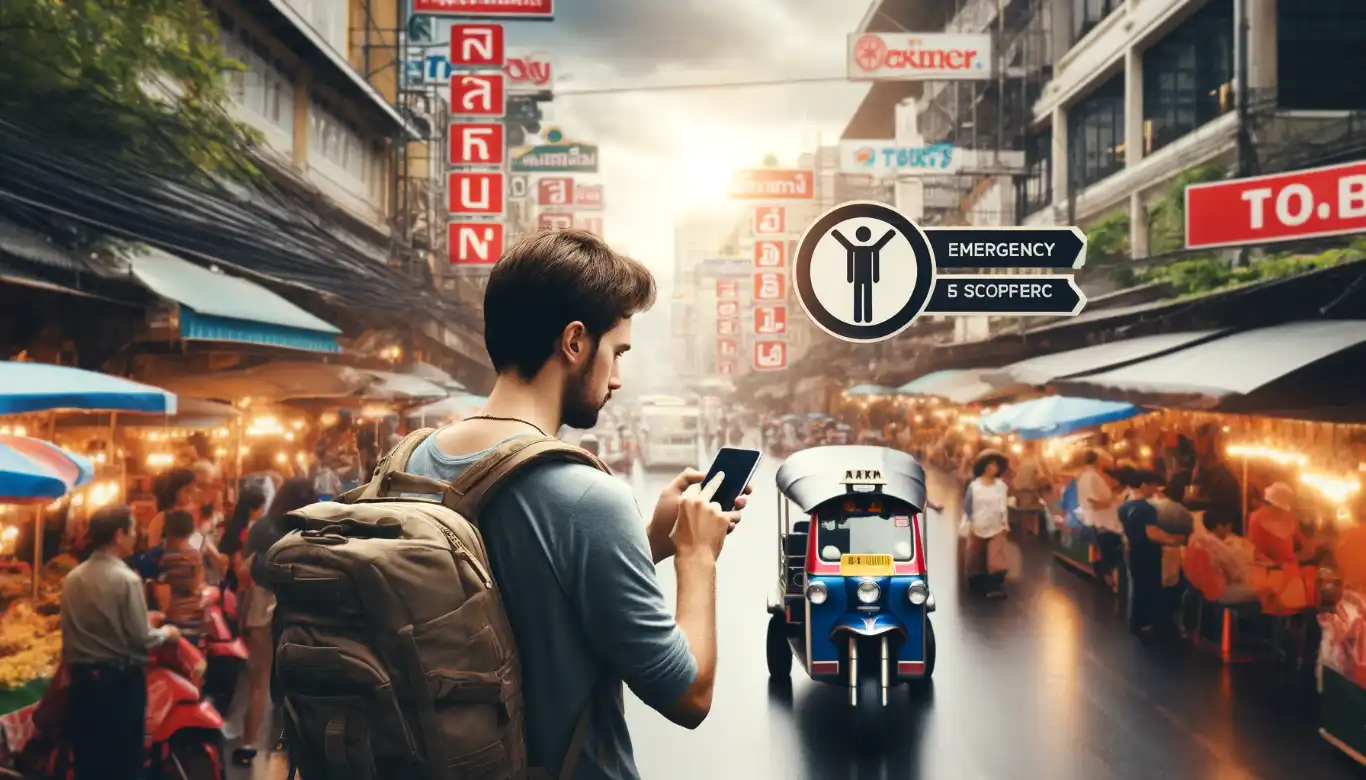
Should you require emergency services or consular assistance during your Bangkok visit, the city has ample resources ready to assist you. Bangkok’s Tourist Police can be reached for emergency assistance 24 hours a day. For non-Thai speakers, emergency assistance can be requested through the tourist police hotline, which provides help in English.
Before embarking on your trip to Bangkok, make sure to note down important emergency numbers. For general emergency services, dial 191 to access:
Vigilios App
Quick Access to All Emergency Numbers in the Vigilios App
Summary
In conclusion, Bangkok is a vibrant city that welcomes tourists with open arms. Its bustling street life, rich cultural heritage, and delicious food make it an unforgettable travel destination. While it’s generally safe, awareness and precautions can ensure a secure and enjoyable trip. Respect for local customs, vigilance against scams and petty crimes, managing the challenging climate, and being prepared for emergencies are all part of the Bangkok travel experience. So, pack your bags, prep your itinerary, and get ready to explore the mesmerizing city that is Bangkok!
Frequently Asked Questions
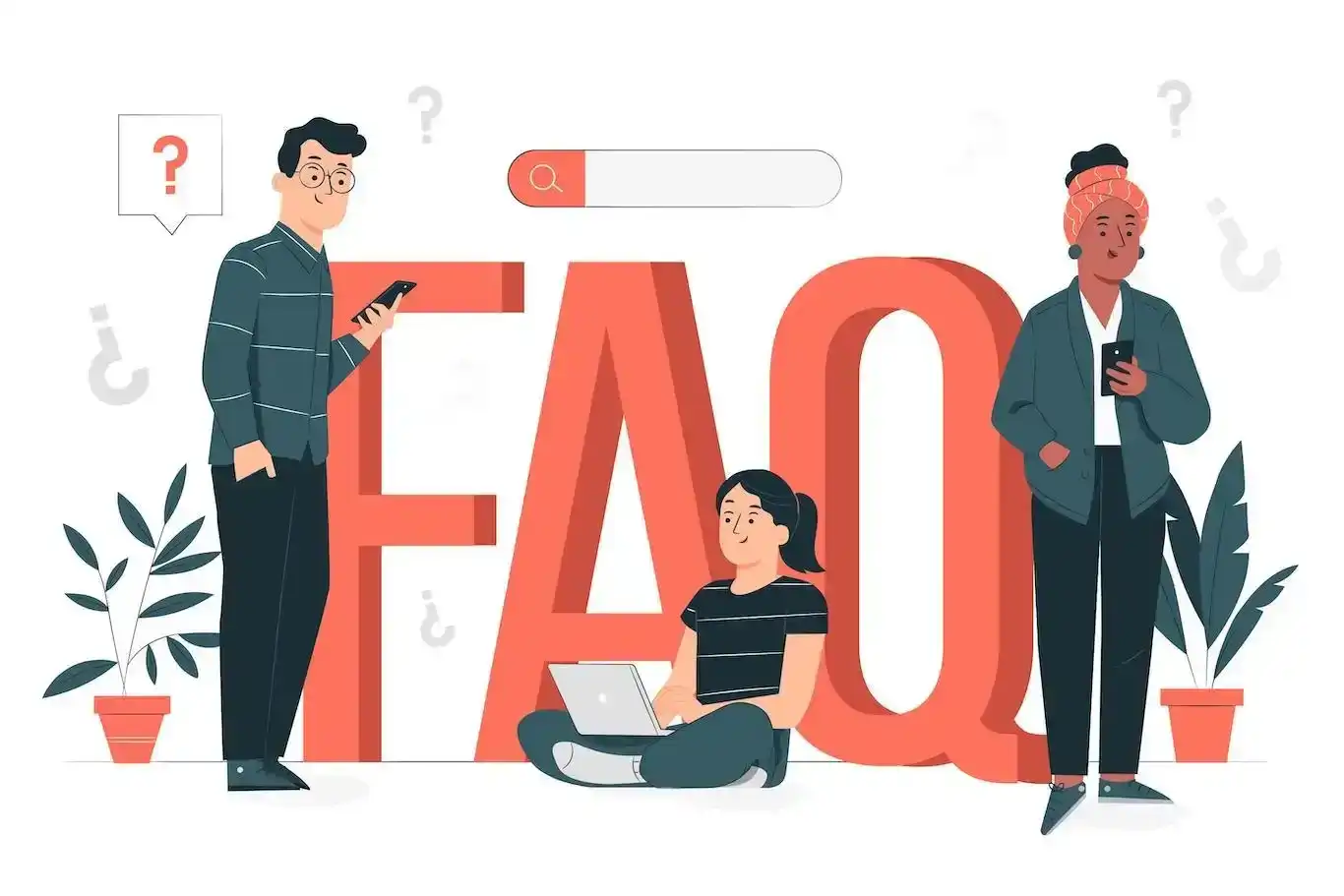
Is Bangkok safe for solo female travelers?
Yes, Bangkok is generally safe for solo female travelers. Like anywhere, it's important to take standard safety precautions such as choosing well-reviewed accommodations and staying aware of your surroundings.
Is Bangkok cheap or expensive?
Bangkok is famous for being a relatively cheap vacation destination, making it an affordable option for travelers.
Is Bangkok safe to visit in 2024?
Yes, Bangkok is generally safe for visitors, but it's important to be aware of potential risks such as scams, traffic, and petty crimes. Stay cautious and alert while exploring the city.
What are the safe areas for tourists in Bangkok?
You'll find Sukhumvit, Silom, Riverside, Siam, and Rattanakosin to be safe areas for tourists in Bangkok. Enjoy your visit!
How can I avoid scams in Bangkok?
To avoid scams in Bangkok, be cautious with tuk-tuk and taxi drivers, verify drink prices before ordering in nightlife areas, and avoid renting motorbikes or jet skis from sources known for fraudulent damage claims. Be aware of these common scams to protect yourself during your visit.
What health measures and vaccinations are recommended for traveling to Bangkok?
Make sure your routine vaccines are up-to-date, and consider getting vaccinated for Hepatitis A, Hepatitis B, Japanese Encephalitis, Typhoid, and Rabies before traveling to Bangkok. Additionally, stick to bottled or disinfected water during your visit.





